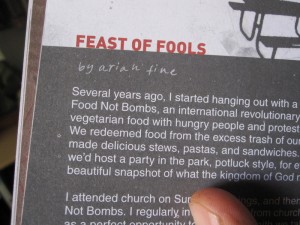 If you haven’t heard, John Piper’s god sent a tornado through downtown Minneapolis last week to tell Lutheran’s not to let gay people become pastors. Let me clarify two things before I get to what this incident rose in my mind: 1) I do not agree with Piper at all on this, 2) Piper’s sermons and books were instrumental in my early faith growth and I have a great deal of respect for him. But on to what I want to write about: exaggerations and doubts.
If you haven’t heard, John Piper’s god sent a tornado through downtown Minneapolis last week to tell Lutheran’s not to let gay people become pastors. Let me clarify two things before I get to what this incident rose in my mind: 1) I do not agree with Piper at all on this, 2) Piper’s sermons and books were instrumental in my early faith growth and I have a great deal of respect for him. But on to what I want to write about: exaggerations and doubts.
Piper’s view of this tornado was, at best, an exaggeration (there’s probably a better term [and a whole lot of much harsher ones], but I’m using this one). There are hundreds of tornados a year and to point out this minor one, which happened to damage the steeple of a church, the hand of God seems like a stretch to me. There are a lot of people who believe in christianity and in God doing miracles and speaking through the natural realm even today. I think you could draw a spectrum from “no miracles” to “everything that happens is a message from god” and most people fall somewhere along that spectrum. I could be wrong, but I bet most folks, even some of the more charismatic types, would see Piper’s tornado as an exaggeration.
Now, anyone whose picked up and read a bible, or heard some of the stories, knows there are a lot of crazy miracle/hand-of-God type things in there: Moses parts the Red Sea, God floods the earth, Jesus heals people’s sicknesses and diseases, the walls of Jericho crumble. Christians tend to take those stories at face value, if you believe in a super-natural God there’s no reason those things couldn’t have actually happened just as they’re written. Other folks see the bible as a mythical story, maybe based on actual history, similar to many others told of gods and goddesses and their interaction with the natural world. They see it as best an exaggeration. One example of this division I can think of Moses parting the Red Sea. You’ve maybe hard something similar: “Some scholars believe that it was actually “Reed Sea” not Red Sea, just knee deep and that’s how the Israelites were able to cross it.” And someone will respond, “But if that’s the case, then isn’t it a miracle that the entire Egyptian army drown in knee deep water!” One group believes God is at work and attributes miraculous acts to God. The other group believes devout followers exaggerate natural events as miracles for their fictitious deity.
For several years, I’ve counted myself in the God does miracles camp. I believe some sort of super-natural being exists and I see no reason to believe that being couldn’t do super-natural miracles. So, I’ve read the Bible and had no problem assuming those stories could have actually happened, just as they’re written. Over the years, I’ve had my doubts about God and faith and a great many things, but I never spent much time debating the validity of the miracles recorded. If God exists, I don’t see any reason they couldn’t be true; if God doesn’t exist, there’s a good chance they aren’t true.
Enter Piper’s Tornado. If John Piper, a devout, respected, faithful, bible-reading-and-believing pastor can equate a tornado damaging a church with the hand of God, how many of the devout followers of God in the Bible exaggerated the stories and miracles they wrote about?
This conclusion didn’t shake up my own faith, I’ve heard enough of these sorts of declarations from others, but I don’t think it’s a good testimony to the evangelism Piper claims to be about.


 My birthday is coming up in less then a month. I don’t often make much of my birthday. I don’t really like getting gifts and have for years (without much success) asked those who wanted to get me something to donate to a cause instead. If I ask anything, it’s been for others to share with me how I’ve had a positive impact on their lives, that’s about it.
My birthday is coming up in less then a month. I don’t often make much of my birthday. I don’t really like getting gifts and have for years (without much success) asked those who wanted to get me something to donate to a cause instead. If I ask anything, it’s been for others to share with me how I’ve had a positive impact on their lives, that’s about it. If you haven’t heard,
If you haven’t heard,  Over the last few years, one consistent ‘pastoral’ voice in my life has been the music and lyrics of Derek Webb. Derek used to play with Caedmon’s Call, a band I was introduced to and thoroughly enjoyed during my high school years. Several years back Webb started doing his own solo albums, all of which have been great, but the last three of which have spoken words of encouragement, conviction and compassion into my life.
Over the last few years, one consistent ‘pastoral’ voice in my life has been the music and lyrics of Derek Webb. Derek used to play with Caedmon’s Call, a band I was introduced to and thoroughly enjoyed during my high school years. Several years back Webb started doing his own solo albums, all of which have been great, but the last three of which have spoken words of encouragement, conviction and compassion into my life. I recently received a copy of the summer CONSP!RE Magazine, in which I have an article. It’s a brief article about working with a group called Food Not Bombs. If you want to get a print copy you can find out where to
I recently received a copy of the summer CONSP!RE Magazine, in which I have an article. It’s a brief article about working with a group called Food Not Bombs. If you want to get a print copy you can find out where to